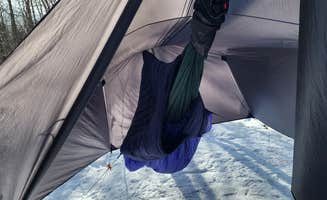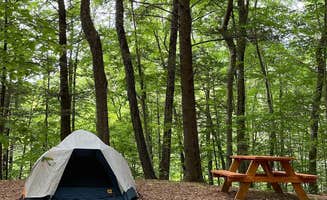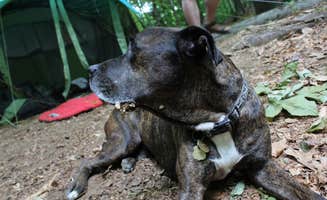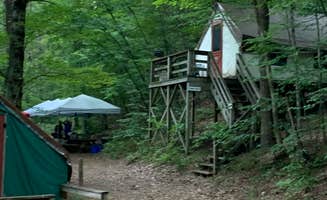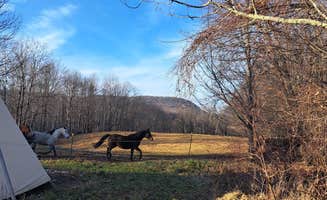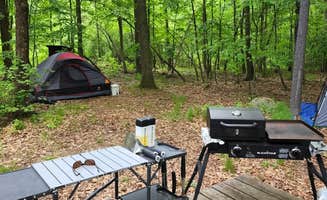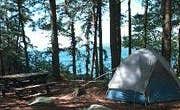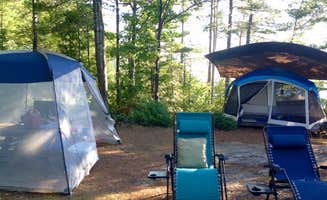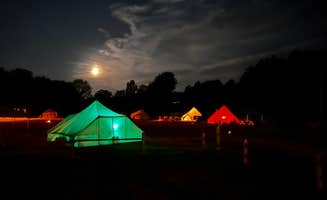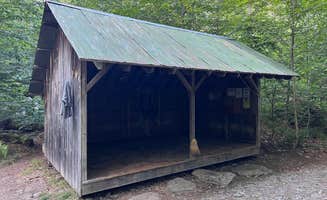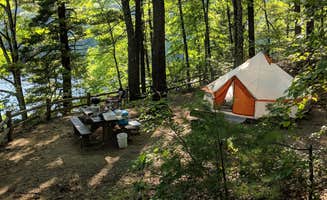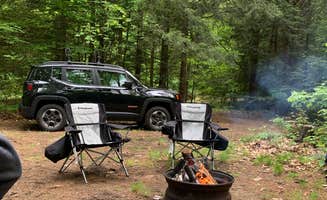Green Mountain National Forest surrounding Sunderland, Vermont provides numerous tent camping locations across varying elevations from 600 to 3,800 feet. Weather conditions can change rapidly with mountain terrain, particularly at higher elevations where temperatures average 10-15 degrees cooler than valley floors. Seasonal accessibility varies significantly, with most primitive sites available from late spring through early fall depending on snowpack conditions.
What to do
Explore local swimming spots: Little Rock Pond offers unexpected swimming opportunities despite its elevation. "The pond is surprisingly warm for its altitude and it's home to two Common Loons. There's a huge jumping rock on the far side of the pond," notes a visitor to Little Rock Pond Group Camp & Shelters.
Book guided river experiences: Tent campers can complement backcountry experiences with scheduled activities at nearby outfitters. Zoar Outdoor offers "white water rafting, tubing and other water activities on a nearby river. It's close to where locals jump off outcrops into the lazy river and hang out on the river side," according to campers at Zoar Outdoor.
Farm experiences: Some private tent sites near Sunderland provide agricultural experiences. "The owners were so friendly and excited to welcome campers. They have a common room that has games and eggs for sale," reports a visitor to Maple Ridge Farm, noting the property offers more amenities than typical forest camping.
What campers like
Island camping privacy: Campers seeking water-adjacent experiences rate island camping highly. "We had a great spot on Long Island! Beautiful view, chill atmosphere, easy boat parking on the slip," shares a visitor to Long Island Group — Lake George Islands. Access requires boat transportation but rewards campers with waterfront sites.
Trail connectivity: Many tent sites connect to major trail systems. The Seth Warner Shelter sits ".2 miles off the LT/AT and sleeps 6-7 people. There is a fire pit," according to a hiker who adds, "If you arrive late and there is no more room in the shelter use your tent or hammock in one of the many flat perfect spots for either."
Caretaker presence: Some shelters feature on-site staff who maintain facilities and collect nominal fees. One camper notes Little Rock Pond is "operated by the Green Mountain Club caretaker who lives onsite, this campsite costs only $5 per person per night. There's a big 3-wall cabin with room for at least 12, several tent platforms."
What you should know
Trail conditions: Expect challenging terrain on approaches to some backcountry sites. One Long Trail hiker reports, "The Long Trail is a very wet nasty trail but it can be dry so be careful having a fire. Hang your food! Watch for bears and coons," when describing Seth Warner Shelter.
Winter preparation requirements: Winter camping requires specialized equipment and experience. A winter camper at Stratton Pond Shelter reports, "Spent the weekend here on the last weekend of Feb. 2024. Cold, Snow, Wind, full moon in the middle of the woods with only the people I hiked in with. The shelter is a 3.75mi hike from the nearest parking lot in winter."
Wildlife management: Wildlife encounters require proper food storage. Multiple campers mention raccoon activity, with one noting, "We were literally bombarded with a group of raccoons each night. It was bad." Proper food storage in sealed containers or bear bags is essential at all primitive tent sites.
Tips for camping with families
Look for transportation assistance: Some private sites offer help with gear transportation. At Maple Ridge Farm, "They'll drive you in an ATV up to some of the sites that are further away from the parking lot," making remote sites more accessible for families with children.
Consider developed facilities: Families may prefer sites with reliable bathroom facilities. "Toilet and shower were very clean. Very lush campground, plenty of space and privacy between sites," notes a reviewer about Maple Ridge Farm, contrasting with primitive sites lacking facilities.
Select shelters with multiple sleeping options: Groups with varying comfort needs appreciate sites with both shelter and tent options. "There's a big 3-wall cabin with room for at least 12, several tent platforms, and there's even a composting privy (#2 only)," notes a camper at Little Rock Pond.
Tips from RVers
Limited RV accommodations: Most tent campsites near Sunderland do not accommodate RVs. Dispersed camping in Green Mountain National Forest primarily serves tent campers, with vehicle size limitations on forest roads. "The campground is connected to an adventure/outing company that provides white water rafting, tubing and other water activities on a nearby river," notes a visitor to Zoar Outdoor, one of the few facilities with limited RV options.
Seasonal limitations: RV access becomes extremely limited during shoulder seasons and winter months when unpaved forest roads become impassable. Plowing schedules vary annually based on snowfall amounts and maintenance resources.
Water and waste management: RVers must bring sufficient water and plan for waste disposal. Most tent sites offer no hookups, dump stations, or reliable water sources beyond natural streams requiring filtration.


